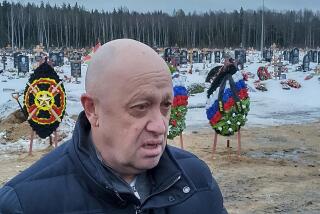Yeltsin Reprimanded for Calling on Gorbachev to Quit : Soviet Union: Lawmakers repeatedly attack his speech. Shevardnadze reappears and asks the two leaders to make peace.
- Share via
MOSCOW — Soviet legislators on Wednesday officially censured Russian Federation President Boris N. Yeltsin for demanding that Soviet President Mikhail S. Gorbachev resign and accused the radical populist of fomenting a “civil war.”
But former Foreign Minister Eduard A. Shevardnadze, making his first appearance on the political scene since he resigned two months ago, called on the two leaders to make peace.
“This war, a war of parliaments, a war of laws and now a war of presidents, must be ended,” said Shevardnadze, who was inaugurating a new non-governmental foreign policy association that he will head. “Everybody must think of the country, the people, the fate of democracy in the Soviet Union and in the world.”
Speaking on Tuesday to millions of Soviet citizens across the country on a live television broadcast, Yeltsin said: “I am disassociating myself from the presidential position and policy and calling for (Gorbachev’s) immediate resignation.”
Yeltsin had suggested in his address that leadership of the country be taken over by the Council of the Federation, which is made up of Yeltsin and the leaders of the 14 other republics.
The Supreme Soviet, the national legislature, voted 292 to 29 to censure Yeltsin for his remarks, which it said “run counter to the Soviet Constitution and create an extraordinary situation in the country.”
During a heated hourlong discussion in the Kremlin hall, Yeltsin’s speech was repeatedly attacked by lawmakers.
“Such a statement as Boris Nikolayevich made yesterday is actually an announcement of civil war,” Anatoly G. Chekhoyev, a leader of the right-wing parliamentary fraction Soyuz, said. “The situation in the country, especially after Yeltsin’s statement, is absolutely critical.”
In the Russian Federation’s legislature, which Yeltsin heads, reactions were mixed.
Liberal Russian lawmaker Yuri Luchinsky said there was “nothing terrible” about Yeltsin’s demand.
“We were not the first to make a step towards confrontation,” Luchinsky told the official Soviet news agency Tass.
But Igor M. Bratishchev, co-chairman of a faction of the Russian legislature called Communists of Russia, criticized Yeltsin’s call for Gorbachev’s departure from office.
“Any sober-minded person has only one reaction to it--negative,” Bratishchev said. “Yeltsin did not advance any proposals on how to make the Soviet Union strong and to consolidate the people, but instead he continued the confrontation between Russia and the so-called center.”
Communists of Russia and other hard-liners called for an extraordinary meeting of the Russian Congress of People’s Deputies, the supreme body of power in the republic. A Yeltsin spokesman said the congress would be used as a venue to oust Yeltsin as Russia’s leader, but Bratishchev denied that.
Sparks have been flying between Yeltsin and Gorbachev for years. Gorbachev fired his former protege from his job as Moscow Communist Party chief in November, 1987, after Yeltsin said that reform was coming too slowly.
Their fight for power was institutionalized when Yeltsin was elected president of the republic of Russia last summer and started pushing Gorbachev’s central government in the Kremlin to give more control to the republics.
In a front-page editorial, the Communist Party newspaper Pravda also lashed out at Yeltsin, saying he “uses all means to assert his personal ambitions and claims, which are miles away from democratization, social renewal and perestroika (restructuring).”
The leadership of the Moscow Communist Party, which Yeltsin headed until Gorbachev fired him, jumped on the anti-Yeltsin bandwagon.
“It is a crime to pit Russia’s interests against national interests. This could further destabilize the situation and worsen ungovernable social process and chaos,” the Moscow Communists said in a statement.
Although many Russians heartily support Yeltsin and his high-volume campaign against the Communist Party powerful and the Moscow-based bureaucracy, a letter published in the rural daily Selskaya Zhizn from a woman from Kingisepp, near Leningrad, showed how much public opinion has been polarized.
“Just why is (Yeltsin) rejecting and criticizing every decree or statement that comes from the president?” she wrote. “Resign immediately, Boris Nikolayevich, don’t lead Russia to a blood bath.”
A poll of 2,650 Muscovites taken by the National Public Opinion Studies on the eve of the Yeltsin speech found 65% praised Yeltsin’s efforts. However, public sentiment on Yeltsin’s call for Gorbachev’s resignation is unclear.
Shevardnadze, seemingly presaging Yeltsin’s remarks, had warned in December that a dictatorship was menacing the Soviet Union, but he said nothing against Gorbachev. Shevardnadze, whose accomplishments included aiding the reunification of Germany and the U.S.-Soviet treaty banning medium-range nuclear arms, indicated that he would publicly oppose Gorbachev and the man who succeeded him as Soviet foreign minister, Alexander A. Bessmertnykh, if he believes they are deviating from the course he had steered.
“We will not keep silent when we see a departure from the policy of new political thinking,” Shevardnadze said. “We will not keep silent when we encounter attacks on accomplishments of the Soviet Union’s new foreign policy.”
Gorbachev, meanwhile, had no public comment on Yeltsin’s challenge.
More to Read
Sign up for Essential California
The most important California stories and recommendations in your inbox every morning.
You may occasionally receive promotional content from the Los Angeles Times.












